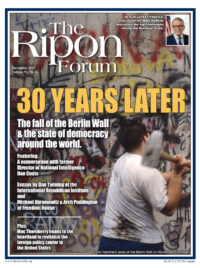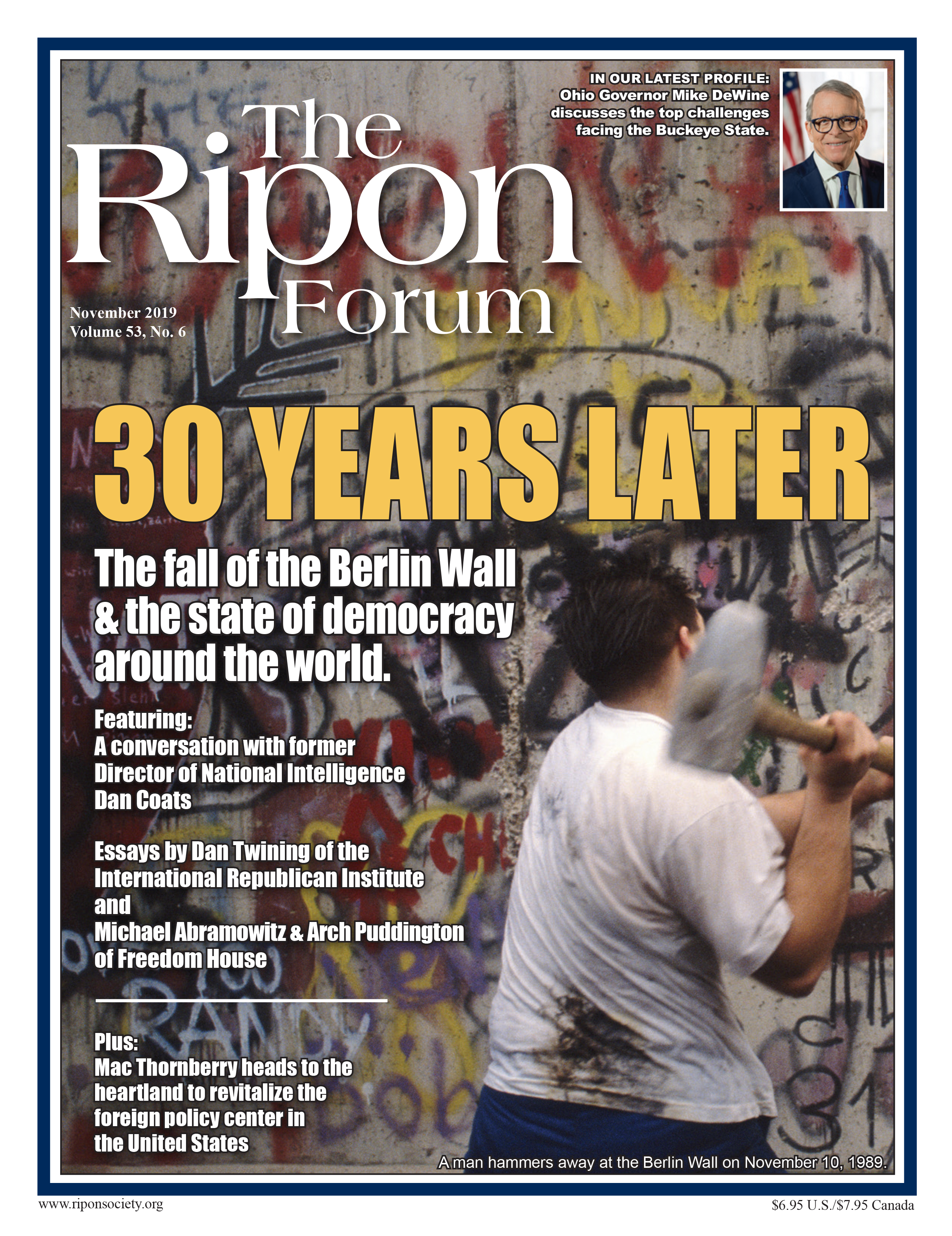Perhaps one of the more fascinating things to emerge from our conversation with Dan Coats in this latest edition of The Ripon Forum is who he says is the American most responsible for helping to bring down communism in 1991. The Forum reached out to the veteran Indiana policymaker to get his thoughts on the fall of the Berlin Wall 30 years ago this month, and the state of world affairs today. Coats is in a better position than most to discuss these topics.
When the Wall came down in 1989, he was serving in the U.S. Senate as a member of the Armed Services Committee. Just over a decade later, he was appointed U.S. Ambassador to Germany. He arrived in Berlin just before the 9/11 terrorist attacks and help guide relations between our two countries in the tenuous weeks and months that followed. Most recently, of course, Coats has served as Director of National Intelligence in the Trump Administration. All of this is to say that Coats has seen a lot and done a lot over the course of his distinguished career. Which is why it was so interesting when he named John Davis as the fourth person — after Lech Wałęsa, Mikhail Gorbachev, and Pope John Paul II – who had “the most critical role in bringing about the collapse of communism in Eastern Europe.”
I have to admit I’d never heard of Davis, so I Googled him. As it turns out, he served as Chief of Mission at the U.S. Embassy in Warsaw from 1983 to 1988, and U.S. Ambassador to Poland from 1988 to 1990. At a time when some members of the U.S. Foreign Service are being accused of being members of the “deep state,” it is notable that a veteran Republican like Dan Coats would point to a career diplomat like John Davis as being even more responsible than Ronald Reagan for bringing down the Berlin Wall. An article that appeared in the December 21, 1989 edition of the New York Times helps explain why Coats feels this way. Published less than six weeks after the Wall came down, it is an account of how Davis gained influence in Warsaw over the years – first by hosting separate dinners with members of the Communist government and the Solidarity Labor Union, and then by hosting dinners where both members of the government and labor leaders were invited. “Communists mingled with Solidarity people,” the Times reported. “Former prisoners clinked glasses with their jailers. The result is that Ambassador John R. Davis Jr. now commands attention and respect in Poland. It is no small success.”
No small success. If there were ever an understatement written about that period, it would be that one. And yet “understated” is perhaps the best word that can be used to describe America’s quiet diplomacy during that pivotal time. It was the type of diplomacy not only practiced by Ambassador Davis, but exemplified by President George H.W. Bush. In an essay in this same edition, historian Jeffrey Engel writes how America’s 41st President approached this period of upheaval. “He did not shout, he did not gloat, he did not boast,” Engel writes. “Bush instead mostly listened during those tumultuous weeks and months of promise and anxiety in 1989, knowing that every time he listened more than he talked when a foreign leader called, and every time he kept his word, faith in him grew.”
Of course, faith in America grew, too — faith in America as a force for good, and faith in America as a symbol of peace, justice, and freedom. Dan Coats touches on this sentiment in his interview with the Forum, when he talks about the hundreds of Germans who showed up outside the gates of the U.S. Embassy in Berlin to pay their respects on 9/11. “I recall with considerable emotion talking with a German woman of my generation as she laid her flowers on the mountain of bouquets at the Embassy’s entrance,” Coats stated. “She said that Americans had helped Germany at its time of greatest need in the trying times after World War II … This woman represented the immediate post-war generation marked by deep gratitude toward the United States for our contributions to Germany’s peace and prosperity. This generation continues to love America.”
It has been 18 years since the terrorist attacks, and three decades since the fall of the Berlin Wall. A lot has clearly changed during that time. What has not changed is the important role that America plays in the world, and the importance of America continuing to be a global force for good. This edition of The Ripon Forum is focused on both the challenges and opportunities the United States faces in that regard, and features some of the leading thinkers and policymakers who – through both intellect and action – are working to not only make the 21st century another American century, but to make sure the advances of the past 75 years have not been for naught.
As with every edition, we thank you for reading, and welcome any comments, suggestions, or questions you may have.
Lou Zickar
Editor of The Ripon Forum
louzickar@clu.ccw.mybluehost.me





